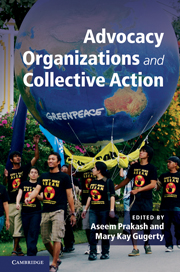Book contents
- Frontmatter
- Contents
- Figures and tables
- Contributors
- Preface
- Acknowledgments
- 1 Advocacy organizations and collective action
- Part 1 The institutional environment and advocacy organizations
- Part 2 Advocacy tactics and strategies
- Part 3 International advocacy and market structures
- 8 The political economy of transnational action among international NGOs
- 9 Advocacy organizations, networks, and the firm analogy
- 10 Shaping civic advocacy
- Part 4 Toward a new research program
- Index
- References
8 - The political economy of transnational action among international NGOs
Published online by Cambridge University Press: 05 June 2012
- Frontmatter
- Contents
- Figures and tables
- Contributors
- Preface
- Acknowledgments
- 1 Advocacy organizations and collective action
- Part 1 The institutional environment and advocacy organizations
- Part 2 Advocacy tactics and strategies
- Part 3 International advocacy and market structures
- 8 The political economy of transnational action among international NGOs
- 9 Advocacy organizations, networks, and the firm analogy
- 10 Shaping civic advocacy
- Part 4 Toward a new research program
- Index
- References
Summary
The central premise of this volume is that a collective action approach based on a firm analogy can help both scholars and practitioners understand how non-governmental organizations (NGOs) interact with their organizational environment and make strategic choices. In doing so, the book seeks to challenge the dominant view (or perhaps complement it, as Risse [this volume] suggests) that NGOs are primarily driven by their common moral purpose and commitment to norms (Wapner, 1995; Finnemore, 1996; Keck and Sikkink, 1998; Boli and Thomas, 1999; Clark, 2001). While not denying that normative considerations play an important role in influencing NGO tactics and strategy, this volume seeks to reveal how structural forces and organizational pressures also guide the choices of international NGOs (INGOs), making their behavior akin to that of firms in the marketplace. In other words, instead of normative considerations dominating their decisions about advocacy strategy and tactics, the collective action approach suggests that instrumental concerns such as the desire to please multiple donors who control the budget strings play an important role in explaining INGO behavior. As a result, the normative gloss recedes in importance and INGOs can no longer be clearly distinguished from their instrumental counterparts that function in the economic marketplace
This chapter examines transnational humanitarian action in the Democratic Republic of Congo and Bosnia. It highlights how organizational insecurity, competitive pressures, and fiscal uncertainty shape the choices of INGOs, and how these pressures can be traced to the institutional and structural context in which these groups function. This chapter demonstrates how powerful institutional imperatives can subvert INGO efforts, prolong inappropriate aid projects, or promote destructive competition among well-meaning transnational actors. Attempts by INGOs to reconcile material pressures with normative motivations often produce outcomes dramatically at odds with liberal expectations.
- Type
- Chapter
- Information
- Advocacy Organizations and Collective Action , pp. 205 - 228Publisher: Cambridge University PressPrint publication year: 2010
References
- 2
- Cited by



